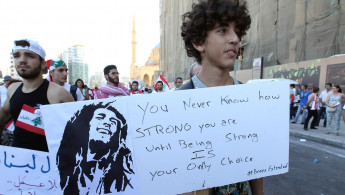Lebanese protesters give government three-day ultimatum
The main group behind the protests in Lebanon has called for the resignation of the Lebanese environment minister over the country's garbage crisis and says it is giving the government 72 hours to begin responding to its demands.
A spokeswoman for the "You Stink" group says the group will escalate its protest actions by Tuesday evening if the government does not respond. It also demanded that the interior minister be held responsible for police brutality against protesters last weekend.
In a speech before thousands of protesters in Beirut, Rasha Halabi said protesters will continue pressuring the government until the election of a president and a new parliament.
The protesters waving Lebanese flags and chanting
| We need a revolution to free ourselves from these politicians. Hani Abu Hamdan |
"revolution" took to the streets of Beirut on Saturday for an unprecedented mobilisation against sectarian politicians they say are incompetent and corrupt.
The "You Stink" protest campaign, ignited by a waste crisis, has widened to reflect anger at widely-perceived graft in the political class and the state's failure to provide basic services.
"We need a revolution to free ourselves from these politicians," said Hani Abu Hamdan, a 23-year-old unemployed civil engineer.
"We want power, we want water, we don't want rubbish in the streets. We want these politicians to get lost."
Protesters mobilised after the government failed to agree on trash disposal, leaving piles of refuse stinking in the summer sun. Protesters say the crisis reflects the rot inside Lebanon's political system.
Similar protests descended into violence last weekend and Prime Minister Tammam Salam threatened to resign, a move that could tip the state struggling with political deadlock and spillover from Syria into deeper turmoil.
Protesters, including families and people of all ages marched, played music and sang as they protested in areas around Martyrs' Square, the scene mass demonstrations in 2005 after the assassination of former Prime Minister Rafik al-Hariri.
By nightfall the area took on the atmosphere of a huge street party as soldiers watched the crowds from newly-erected barricades.
"People want the downfall of the regime" chanted groups of marching protesters, employing the slogan of mass movements that shook the Arab world in 2011.
Campaigners are calling for the environment minister to resign, for snap parliamentary elections and a resolution to the garbage crisis. They want better public services in a country with daily electricity cuts and summer water shortages.
They are also frustrated with the parliament that has extended its own term until 2017. Lebanon has been without a president for more than a year and the last parliamentary polls took place in 2009.
'Good at corruption'
One protester held aloft a sign showing pictures of leaders of six of the main Lebanese factions reading: "We will not elect you again, and all of you means all of you."
Another sign read: "You failed in running the country, you failed in running worship, you succeeded at theft and corruption."
The garbage crisis has exposed wider frustrations
in Lebanon, where sectarian and power rivalries have been intensified by the Syrian conflict next door, more than two decades after Lebanon's own civil war.
Salah Noureddine, a Lebanese national who travelled from Britain to take part in the protest, said it was time to remove "the corrupted system we inherited after the civil war".
"If we stay at home, they will rule for another 25 years or more," he said.
Amnesty International said on Saturday Lebanon should investigate allegations that security personnel used excessive force to disperse protesters in Beirut last week, calling for restraint ahead of the new rally.
Organisers blamed last weekend's violence on "infiltrators" linked to political movements. Security forces last week fired water cannon and tear gas at demonstrators, some of whom threw stones and sticks at riot police.
Amnesty, quoting figures from the Red Cross, said at least 343 people were treated for injuries and 59 more were hospitalised last week.





 Follow the Middle East's top stories in English at The New Arab on Google News
Follow the Middle East's top stories in English at The New Arab on Google News


